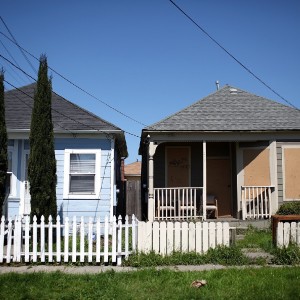
A new study on the continuing fallout from the collapse of the housing market calls on both loan holders and government at all levels to take stronger action to address the still widespread crisis of "underwater homes" — properties for which mortgage payers owe more than their homes are worth.
One of the solutions suggested — seizure of underwater homes by local governments under eminent domain — is already being attempted by the city of Richmond in the face of fierce opposition from the local real estate industry.
The report, "Underwater America," was produced under the auspices of UC Berkeley's Haas Institute for a Fair and Inclusive Society and catalogs cities and ZIP codes still burdened with large numbers of underwater homes years after the declared end of the Great Recession.
The study, using data from real estate data firm Zillow, names Hartford, Connecticut as the hardest-hit U.S. city, with 56 percent of homes underwater. Among ZIP codes, a swath of more than a dozen zones northwest of Atlanta shows underwater numbers ranging from 65 percent to 76 percent.
The list of hardest-hit cities includes several in the Bay Area and Northern California: Vallejo is listed at No. 25, with 36 percent of homes underwater. Others in the region include Stockton, Modesto, Fairfield, Antioch, Richmond, Sacramento and Salinas. Other California cities named are concentrated in the exurban belt north and east of Los Angeles and in the San Joaquin Valley, including Victorville (with the state's highest underwater rate, 40 percent) Lancaster, San Bernardino, Palmdale, Visalia, Fresno, Bakersfield and Rialto. Nineteen of the 395 hardest-hit ZIP codes are in California.
